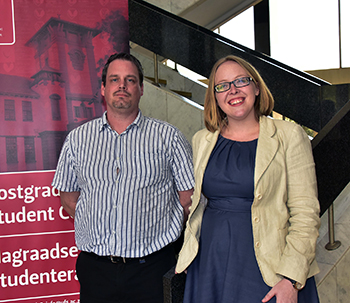Latest News Archive
Please select Category, Year, and then Month to display items
14 June 2024
|
Story Anthony Mthembu
|
Photo Suplied
 Jeremiah Hlahla, a UFS student completing his PhD in Botany at the University of Debrecen as part of an exchange initiative funded by the Erasmus+ Mobility Programme.
Jeremiah Hlahla, a UFS student completing his PhD in Botany at the University of Debrecen as part of an exchange initiative funded by the Erasmus+ Mobility Programme.
As part of an exchange initiative facilitated by the Erasmus+ Mobility Programme, Jeremiah Hlahla, a student at the University of the Free State (UFS), is nearing the completion of his PhD studies at the University of Debrecen in Hungary. Hlahla’s journey, which began in February 2024 and is set to conclude in July 2024, has been a remarkable learning opportunity. “As a first time-traveller to Europe, I have thoroughly enjoyed engaging with people from different countries and cultures,” he said.
The benefits of international collaboration
Hlahla is currently pursuing a PhD in Botany, focusing on plant stress physiology. “My current PhD project investigates the physiological, biochemical and morphological responses of vegetable-type soybean, or edamame, to combined drought and heat stress,’’ he explained. He considers the University of Debrecen the ideal institution to complete his research due to its extensive expertise and resources in similar projects. He noted that his colleagues at Debrecen conduct significant work on plant protection against biotic and abiotic stresses, including salt and drought stress, as well as proteins and amino acids in barley and other legumes.
Given the vast knowledge available on similar projects, Hlahla has found substantial engagement with his work at the University of Debrecen. “Upon arrival, I delivered an introductory lecture presenting my UFS project on the synergistic effects of combined drought and heat stress on the physiology and biochemistry of edamame. It was an engaging session as everyone could relate to my work and asked many questions,’’ he said.
Insights gained from the exchange
Hlahla has also gained valuable lessons that will assist him in his research career, including biotechnology and physiology tools. “I learned how to prepare samples and use high-performance liquid chromatography (HPLC) and reversed-phase ultra-high-performance liquid chromatography (UHPLC) to quantify proteins and amino acids,’’ he said. These techniques are beneficial not only for his current work but will also support future soybean research.
As his experience at the University of Debrecen nears its end, Hlahla reflects on the collaborations and friendships he has formed, which stand out as a significant highlight.
National 3MT competition held at UFS
2017-03-29

The two winners of the Three minute thesis
competition, Andrew Verrijdt (left) and
Kerryn Warren (right).
Photo: Charl Devenish
From Neanderthal hybrid children to eating corn silk as a way of managing kidney diseases, the National Three Minute Thesis competition (3MT) captivated the mind.
“We brought the competition to South Africa and hosted the local, regional, and national competitions for the past few years,” said Dr Emmie Smit, organiser of the event. It is an opportunity to raise the profile of postgraduate research and to develop a cross-disciplinary student community to effectively communicate research to a wide audience. The event was founded by the University of Queensland, Australia. The third national 3MT competition took place at the University of the Free State (UFS) on Friday 24 March 2017.
Three minutes and one slide
During the competition, participants had three minutes to explain their master’s or doctoral research and one static PowerPoint slide could be used. “It is very important that this slide works for you. There must be some way the information on the slide connects to what you present,” said Dr Henriette van den Berg, Director of the Postgraduate School at the UFS.
Winners grateful for opportunity
“It is an honour and a drive. It is very nice to have this sort of thumbs up,” said Kerryn Warren, winner of the Science category. Her research title was, What did a Human-Neanderthal Child Look Like? “I have been looking at the hybrids between different species and subspecies of mice in order to use them as a model to find out what human hybrids looked like.”
The presentation by Andrew Verrijdt, winner of the Humanities category, entitled Hiding in the Deep: Anonymous Websites for Paedophiles on the ‘Darknet’, gave a glimpse into the mysterious and dangerous realm of the dark web. “I am grateful for the opportunity. Primarily because I think it’s an important topic, and society will benefit by getting the word out there as it is a sensitive topic,” he said. The two winners, both from the University of the Cape Town, won R15 000 each. A further R30 000 of prize money went to the four runners-up.